
Peacebuilding Event & Fair
Building Peace Across Borders from Colombia to San Diego
Wednesday, September 28, 2022
LECTURES | 10 a.m.; 1 p.m.
Conrad Prebys Aztec Student Union Theatre and via Zoom - RSVP to receive the link
PEACE FAIR | 9-10 a.m.; 11:30 a.m.-1 p.m.; 2-3 p.m.
Aztec Student Union Goldberg Courtyard
How do you build peace in a country after 60 years of civil war? When over 200,000 people have been killed by violence, eight million people are refugees in their own country, and so many different militias and armed groups have taken up arms, the murk of death and terror is confusing and blurry. Who are the good guys? Who is the enemy? How do you move a country forward towards peace when war has been the backdrop to life for three generations?
This is the story of Colombia. After over 60 years of civil war, in 2016 the Colombian government signed an historic peace agreement with the longest standing, largest guerrilla insurgency in the western hemisphere, the Revolutionary Armed Forces of Colombia (FARC). After four years of negotiation in La Havana, Cuba, the FARC and the government agreed to stop killing each other, and the FARC agreed to lay down their weapons. Since then, Colombia has been slowly, but surely, moving toward the horizon of peace, with justice for victims and their loved ones.
This event features a panel of members of the Platform for Peace, an inter-ethnic, intercultural initiative for peace and justice that has brought together Indigenous leaders, Afro-Colombian communities, campesino associations, and former FARC combatants in a collective process for dialogue and sustainable development.
The platform consists of representatives from dozens of community-based economic development cooperatives and associations, while providing a safe space for dialogue, exchange, and mutual care. The philosophy of the platform is that without economic justice, there will be no peace. Without agricultural reform and political advocacy, peace will be nothing but discourse. This kind of platform is historic and represents a vision for a new nation, a new economy, and a new social contract; one built on peace, reconciliation, and justice.
Following the conversation with the panel of Platform for Peace, SDSU faculty will respond with reflections on what lessons can be learned from Colombia that apply to the San Diego region. What do peace, reconciliation, and justice look like in the United States? How can true, civil dialogue across political, religious, racial, and economic divides be made possible in a moment of such deep division in the United States? What are the lessons from other places of war (like Vietnam) that the United States can apply to build peace and justice at home?
Beginning with the affirmation that human rights are universal, can we see the humanness of those who think, and act, so differently from us? How do we tell the truth about the history of the United States in order to move towards reconciliation and true structural justice?
After the event, attendees are invited to explore options for getting involved with
peace building efforts in San Diego, and around the world, through the Peace Fair
that will feature tabling from local, national, and international peace and justice
organizations, AND FREE SNACKS.
Panel 1: Building Peace After War in Colombia (10 - 11:14 a.m.)
Submit your questions for the panelists.
Featured Colombian Panelists
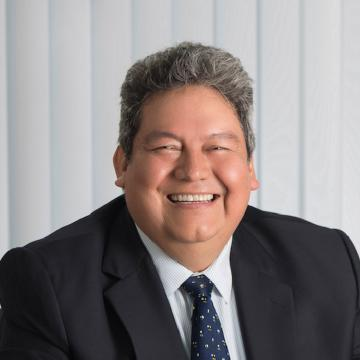 Manuel Ramiro Muñoz, Ph.D.
Manuel Ramiro Muñoz, Ph.D.
Director and Founder, Institute for Intercultural Studies, Javeriana University, Cali,
Colombia
Manuel has over 30 years of experience accompanying Indigenous, Afro-Descendent and
Campesino communities in strengthening organizing and educational processes, in promotion
of intercultural dialogue, positive conflict transformation, and peacebuilding. He
has led and facilitated many spaces for inter-sector social dialogue at the regional
and national levels. He was named one of the most influential leaders in Colombia
in 2016 by the Colombian Leadership Foundation and Semana Magazine. He currently accompanies
processes of territorial preparation, particularly in South Western Colombia, for
the implementation of the Havana Peace Accords.
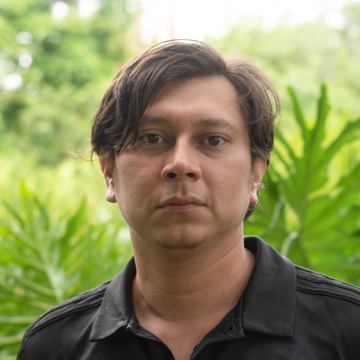 Edilberto Vergara Arguello
Edilberto Vergara Arguello
Interim Director and Principal Researcher, Research Group on Social Movements, Interculturality
and Peacebuilding Institute for Intercultural Studies, Javeriana University, Cali,
Colombia
Edilberto accompanies and researches territorial and social movements for peace in
South Western Colombia with the Universidad Javeriana's Institute for Intercultural
Studies. Edilberto collaborates with local community participation and social engagement
in studies of socio-environmental conflicts as they affect Indigenous, campesino,
and Afro-descendent communities. He has particular experience with grassroots organizing,
advocacy, and accompaniment of rural social processes in sustainable development and
land rights, as well as advising government agencies on public policy for peacebuilding
in the region.
 Alex Arnol Lucumí Carabáli
Alex Arnol Lucumí Carabáli
Economist, Community leader and Legal Representative of Regional Campesino Association
of Northern Cauca
Alex has over 20 years of experience working in community organizing and intercultural dialogue for peace. As an economist with specialized experience in marketing and finance, Alex currently works as administrator and entrepreneur for peace through marketing the products of various rural cooperatives engaged in sustainable small-business ventures. He has served as a consultant for economic development initiatives in different areas of the South Western region of Colombia, and has taught classes on Social Policy Design and Implementation.
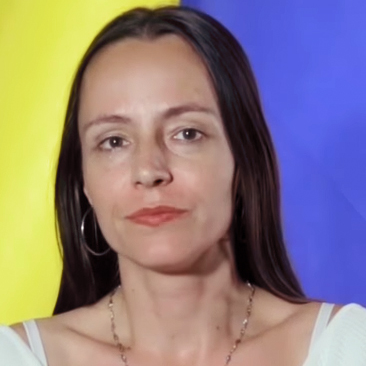 Tanja Nijmeijer
Tanja Nijmeijer
Tanja was born in the Netherlands, where she studied Romance Languages and Cultures. In 2000, during her university practice in Colombia, she got to know the Colombian reality, the armed conflict, and the existence of the Revolutionary Armed Forces of Colombia, FARC. In 2002, she joined the guerrilla forces, where she performed various activities, such as teaching English, Marxist philosophy, and other topics to combatants, as well as developing all daily activities in the jungle.
In 2012, Tanja joined the negotiations between Government and guerrilla in Cuba for four years. After the signing of the peace agreement, she lived in a transition area for decommissioning weapons and reincorporating ex-fighters in the West of Colombia. Afterward, she finished her master's degree in Interculturality, Development, and Territorial Peace at the Javeriana University in Cali. She also completed a Specialization in Investigation Methods with CLACSO. Currently, she's enrolled in a Ph.D. program at the University of Basque Country on social representations of the enemy during the conflict in Colombia.
Tanja is currently working for the reintegration of ex-combatants in Colombia through the creation of cooperatives at the local level, supported by international cooperation agencies. She's living in the city of Cali with her husband, also an ex-fighter, three dogs, and a cat.
Panel 2: Coming Together: Reflections on Peace and War (1 - 2 p.m.)
Submit your questions for the panelists.
Featured SDSU Panelists
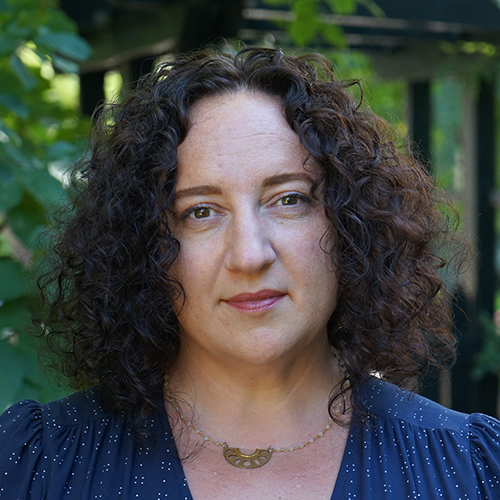 Rebecca Bartel, Ph.D.
Rebecca Bartel, Ph.D.
Fred J. Hansen Peace Chair; Associate Director, Center for Latin American Studies;
Associate Professor, Study of Religion
Rebecca is an anthropologist of religion and political economies, and her research
traces the entangled realms of faith, capitalism, and systems of structural violence
throughout the Americas. Her first book, "Card Carrying Christians: Debt and the Making
of Free Market Spirituality in Colombia" (University of California Press, 2021), is
an ethnographic account of the relationship between Christianity and credit and the
aspirations of everyday Colombians to generate prosperous and peaceable futures despite
the debt they might incur, and amid ongoing violence.
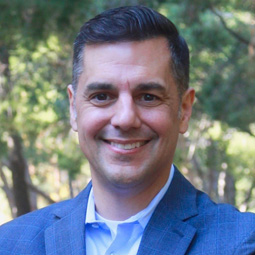 Gregory A. Daddis, Ph.D.
Gregory A. Daddis, Ph.D.
Director, Center for War and Society; USS Midway Chair in Modern U.S. Military History;
Professor, History
Gregory joined SDSU after directing the M.A. Program in War and Society Studies at Chapman University. Prior, he served as the Chief of the American History Division in the Department of History at the United States Military Academy at West Point. A retired U.S. Army colonel, he deployed to both Operations Desert Storm and Iraqi Freedom. Gregory specializes in the history of the Vietnam Wars and the Cold War era. He has authored five books, including "Pulp Vietnam: War and Gender in Cold War Men's Adventure Magazines" (2020) and "Withdrawal: Reassessing America's Final Years in Vietnam" (2017). He has also published numerous journal articles and op-ed pieces commenting on current military affairs, including writings in the New York Times, the Washington Post, and National Interest magazine.
 Ramona Pérez, Ph.D.
Ramona Pérez, Ph.D.
Director, Center for Latin American Studies; Professor, Anthropology
Ramona has worked for more than 25 years on issues of gender and empowerment, lead poisoning among rural and indigenous people of Oaxaca, migration from Mexico and Central America to the U.S. and Baja California, Interpersonal violence against women and children, structural violence and health, and identity among indigenous Mexicans and Latinxs on both sides of the U.S./Mexico border. Her publications appear in English and Spanish, in journals and manuscripts in anthropology, geography, public health, social work, criminal justice, and medicine. She also serves as an expert witness on Mexico in the asylum courts and is a certified expert witness for the family courts in San Diego on binational youth identity. Ramona is currently the president of the American Anthropological Association, the largest association of anthropologists in the world.
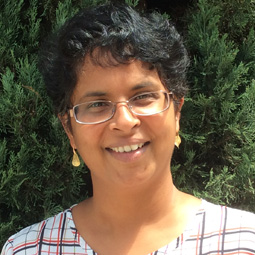 Latha Varadarajan, Ph.D.
Latha Varadarajan, Ph.D.
Director, International Security and Conflict Resolution Program; Professor, Political
Science
Latha's research is at the intersection of international relations theory, global political economy, and international security. More specifically, her published work has focused on the politics of transnationalism (specifically state-diaspora relations), the connections between neoliberal economic restructuring and national security policies; the meaning and relevance of postcolonial struggles; and the debates surrounding the contemporary manifestations of imperialism. She is currently working on a book project that combines her international law and international relations background to discuss the contemporary development of a legal-humanitarian world order.
This event is brought to you by the SDSU Annual Fund for Excellence, Fred J. Hansen Peace Chair, Center for War and Society, ISCOR, and Center for Human Rights.